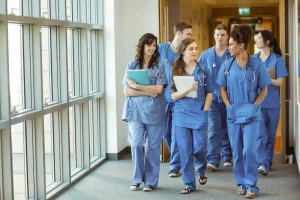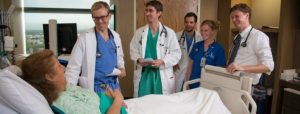Role of junior doctor: tasks and skills

These are the tasks and skills that may be needed as part of the role of junior doctor.
There is a diverse range of tasks they perform on a daily basis. Let’s go through them.
Patient reviews on ward rounds
One of the primary responsibilities of a junior doctor in the NHS is conducting patient reviews during ward rounds.
The ward round is where the consultant in charge (a.k.a. ‘the boss’; or sometimes his/her deputy called a ‘registrar’) goes round and generally sees every patient under their care.
These rounds involve assessing the condition of patients, checking vital signs, and ensuring they are on the right track towards recovery. You main role is administrative, i.e. to write down (and later enact) the plan made on the ward round.
You also need to keep the ward round moving, reduce the chat, and co-ordinate with the nurses, AHPs, and pharmacists. If there are medical students, you need to keep them focused (give them a task) and make sure they get a little teaching.
The ward round is normally done as a team so everyone knows what the plan is for each patient.
Depending on how many patients your team is looking after this can take from under an hour to nearly all day!
On the ward round the lead (usually a consultant or registrar) will:
- See how the patient feels this morning – are they in pain? Have they been eating and drinking well? Do they have any questions regarding their treatment?
- Check their ‘observations’ (vital signs) – the nursing staff regularly carry out observations (things like blood pressure, heart rate, oxygen saturations etc) on every patient
- Examine the patient – examination is a vital skill in a doctor’s toolkit; laying a hand on a patient can reveal a lot more information than numbers from observation charts alone
- Check if there are any tests outstanding – are they waiting for an x-ray or for some blood tests to be done, or has the result come back? If so, you need to document them and inform the broader team
- Decide if any further tests are needed – does the patient need further tests (e.g. bloods and scans) requesting?
- Change the patient’s medication if needed – do they need any medications added or taken away from their current regime? For example, do they need to start antibiotics for a new infection they have developed while in hospital?
- Explain things to the patient – you may need to come back after the ward round to do this, if the pace of it prevents long explanations.
Management of acutely unwell patients
Junior doctors are often at the forefront when it comes to managing acutely unwell patients and escalate the situation to senior doctors when required.
Procedures and medication
Junior doctors gain valuable hands-on experience by performing various medical procedures. This includes tasks like taking blood samples, inserting cannulas for intravenous access, and placing nasogastric (NG) tubes.
These procedures are essential for diagnosing and treating patients effectively.
Junior doctors also play a primary role in prescribing medications – ensuring the right drugs are administered at the right doses.
Medication reconciliation
Medication reconciliation is a critical task to ensure that patients’ current medications align with their treatment plan- and what they were on before, on admission.
GP and hospital computers don’t link up. So mistakes are common. It is your job to reduce their likelihood.
Investigations
Junior doctors request diagnostic investigations such as blood tests, x-rays, ultrasounds, CT scans; many of which are vital as they can clinch the diagnosis.
Collaboration with radiologists
Junior doctors often find themselves in close collaboration with radiologists. They discuss patients’ cases, interpret imaging results, and negotiate with radiologists to prioritise certain imaging scans (especially when rapid action is required).
This collaboration can lead to conflict (that you have to deal with). e.g. when the boss asks for a scan but the radiologist refuses – but is essential for making timely and accurate diagnoses.
Referrals to specialties
Junior doctors are also responsible for referring patients to specialist medical and surgical teams when necessary. They also have to chase up these referrals when they don’t happen in a timely manner (or the specialist forgets!).
Admissions
Furthermore, junior doctors handle new patient admissions. This is called ‘clerking’, which means taking a history, examining the patient, coming up with a tentative diagnosis, and initiating a treatment plan. Writing up their medication is a vital part of this process.
Documentation and administrative tasks
Junior doctors must maintain accurate and detailed patient records. This includes writing discharge summaries, verifying deaths, and filling out death certificate forms when necessary. These administrative tasks are crucial for the continuity of care and legal documentation.
Consenting patients
Before performing any medical procedures or surgeries, junior doctors may obtain informed consent from patients (or their legal representatives). This involves explaining the procedure, potential risks, benefits, and alternatives to ensure patients fully understand and consent to the treatment.
Note. You should not consent a patient if you don’t understand (and can convey) the risk : benefit analysis.


